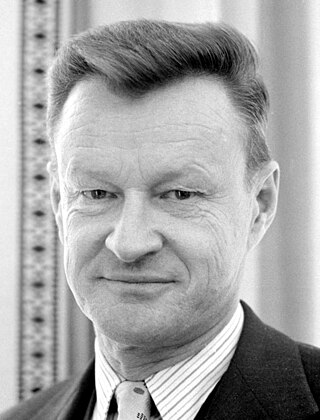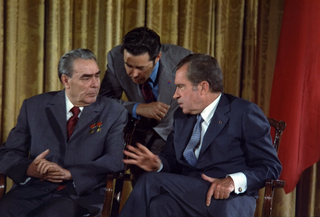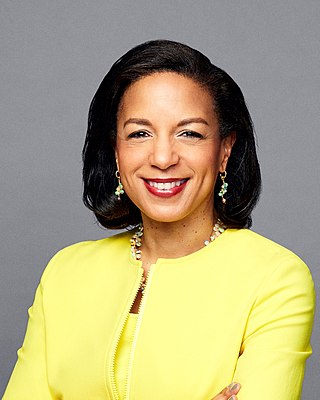
Zbigniew Kazimierz Brzeziński, known as Zbig, was a Polish-American diplomat and political scientist. He served as a counselor to Lyndon B. Johnson from 1966 to 1968 and was Jimmy Carter's National Security Advisor from 1977 to 1981. As a scholar, Brzezinski belonged to the realist school of international relations, standing in the geopolitical tradition of Halford Mackinder and Nicholas J. Spykman, while elements of liberal idealism have also been identified in his outlook. Brzezinski was the primary organizer of The Trilateral Commission.

"State Sponsors of Terrorism" is a designation applied to countries that are alleged to have "repeatedly provided support for acts of international terrorism" per the United States Department of State. Inclusion on the list enables the United States government to impose four main types of unilateral sanctions: a restriction of foreign aid, a ban on weapons sales, heightened control over the export of dual-use equipment, and other miscellaneous economic sanctions. The State Department is required to maintain the list under section 1754(c) of the National Defense Authorization Act for Fiscal Year 2019, section 40 of the Arms Export Control Act, and section 620A of the Foreign Assistance Act.

John Henry Sununu is an American politician who served as the 75th governor of New Hampshire from 1983 to 1989 and the White House chief of staff under President George H. W. Bush from 1989 to 1991.

Raúl Modesto Castro Ruz is a Cuban retired politician and general who served as the first secretary of the Communist Party of Cuba, the most senior position in the one-party communist state, from 2011 to 2021, and President of Cuba between 2008 and 2018, succeeding his brother Fidel Castro.

Lawrence Sidney Eagleburger was an American statesman and career diplomat, who served briefly as the secretary of state under President George H. W. Bush from December 1992 to January 1993, one of the shortest terms in modern history. Previously, he had served in lesser capacities under Presidents Richard Nixon, Jimmy Carter, and Ronald Reagan, and as deputy secretary of state to James Baker under George H. W. Bush. Eagleburger is the only career Foreign Service Officer to have served as secretary of state. He was also Deputy Assistant Secretary of Defense from January to May 1973. As a career member of the United States Senior Foreign Service, he attained the rank of Career Ambassador on April 12, 1984.

Détente is the relaxation of strained relations, especially political ones, through verbal communication. The diplomacy term originates from around 1912, when France and Germany tried unsuccessfully to reduce tensions.

Presidential elections were held in El Salvador on 21 March 2004. Antonio Saca of the Nationalist Republican Alliance (ARENA) party won the election with 57% of the vote, avoiding the need for a run-off on 2 May.

Otto Juan Reich is an American diplomat and lobbyist who worked in the administrations of Presidents Ronald Reagan, George H. W. Bush, and George W. Bush. Reich was born in Cuba; his family moved to North Carolina when he was fifteen. He graduated from University of North Carolina in 1966, and after a two-year stint in the US Army, received a master's degree from Georgetown University in 1973. After graduating, Reich worked for the state and federal governments in Florida and Washington, D.C.

United States–Venezuela relations have traditionally been characterized by an important trade and investment relationship as well as cooperation in combating the production and transit of illegal drugs.

Susan Elizabeth Rice is an American diplomat, policy advisor, and public official. As a member of the Democratic Party, Rice served as the 22nd Director of the United States Domestic Policy Council from 2021 to 2023, as the 27th U.S. Ambassador to the United Nations from 2009 to 2013, and as the 23rd U.S. National Security Advisor from 2013 to 2017.

On May 8, 2006, Iranian President Mahmoud Ahmadinejad sent a missive directly to then United States President George W. Bush that proposed "new ways" to end the dispute over the Islamic Republic's development of nuclear power.

The Republic of Turkey (Türkiye) and the United States of America established diplomatic relations in 1927. Relations after World War II evolved from the Second Cairo Conference in December 1943 and Turkey's entrance into World War II on the side of the Allies in February 1945. Later that year, Turkey became a charter member of the United Nations. Since 1945, both countries advanced ties under liberal international order, put forward by the US, through a set of global, rule-based, structured relationships based on political, and economic liberalism. As a consequence relationships advanced under G20, OECD, Council of Europe, OSCE, WTO, the Euro-Atlantic Partnership Council, IMF, the World Bank and the Turkey in NATO.

Robert Malley is an American lawyer, political scientist and specialist in conflict resolution, who was the lead negotiator on the 2015 Iran nuclear deal known as the Joint Comprehensive Plan of Action (JCPOA).

Jeffrey Mark Goldberg is an American journalist and editor-in-chief of The Atlantic magazine. During his nine years at The Atlantic prior to becoming editor, Goldberg became known for his coverage of foreign affairs. Goldberg became moderator of the PBS program Washington Week in August 2023, while continuing as The Atlantic's editor.

The United States was, in 1824, the second country to recognize the independence of Brazil, after Argentina did it in 1823. Brazil was the only South American nation to send troops to fight in Europe alongside the Allies in World War II.

The term Obama Doctrine is frequently used to describe the principles of US foreign policy under the Obama administration (2009–2017). He relied chiefly on his two highly experienced Secretaries of State—Hillary Clinton (2009–2013) and John Kerry (2013–2017)—and Vice President Joe Biden. Main themes include a reliance on negotiation and collaboration rather than confrontation or unilateralism.
For purposes of U.S. foreign policy, Europe consists of the European Union and non-EU states in Europe.

The second inauguration of Barack Obama as the 44th president of the United States was the 57th inauguration, marking the commencement of his second and final term, with Joe Biden as vice president. A private swearing-in ceremony took place on Sunday, January 20, 2013, in the Blue Room of the White House, followed by a public inauguration ceremony on Monday, January 21, 2013, at the West Front of the United States Capitol in Washington, D.C.

The Joint Comprehensive Plan of Action, commonly known as the Iran nuclear deal or Iran deal, is an agreement on the Iranian nuclear program reached in Vienna on 14 July 2015, between Iran and the P5+1 together with the European Union.

The White House Office of Intergovernmental Affairs (IGA) is a unit of the White House Office, within the Executive Office of the President. It serves as the primary liaison between the White House and state, county (or county-equivalent), local, and tribal governments. The office focuses on building new and maintaining current relationships with governors, tribal leaders, mayors, state legislators, and county executives. The Office of Intergovernmental Affairs works with federal agencies and departments to ensure appropriate coordination between state, local, and tribal governments and the federal government. The Director of Intergovernmental Affairs at the White House Office for the Biden administration was Julie Chavez Rodriguez until she resigned on May 16, 2023 to become Biden's Campaign Manager for his 2024 reelection bid. Tom Perez became Director on June 12, 2023.



















